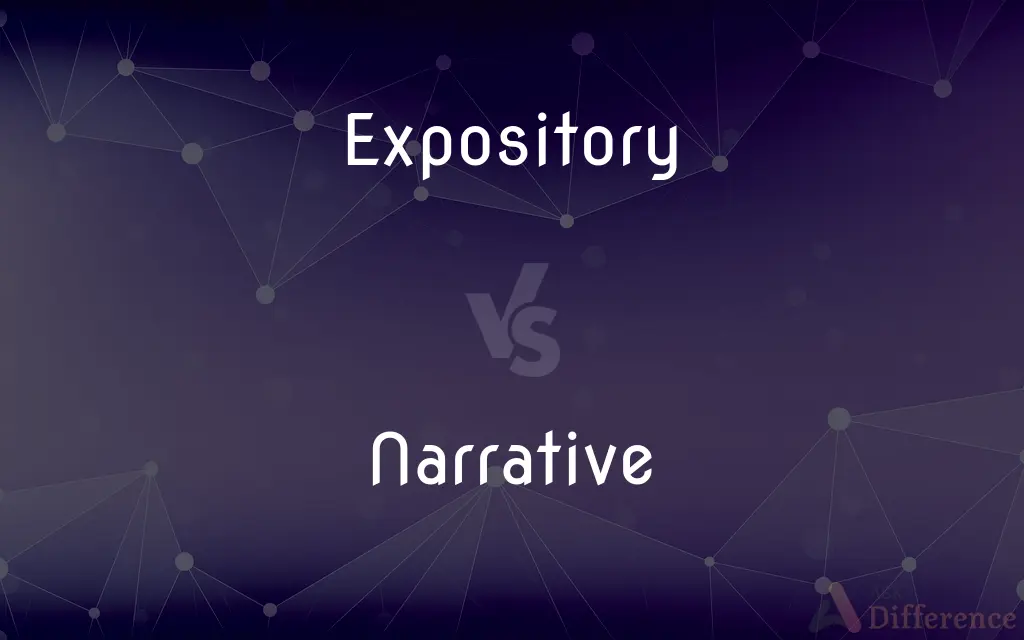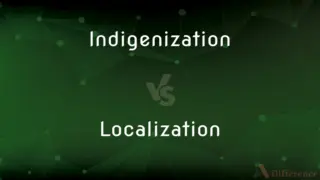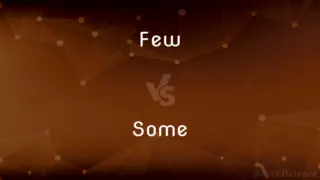Expository vs. Narrative — What's the Difference?
By Fiza Rafique & Maham Liaqat — Updated on April 18, 2024
Expository writing explains or informs with facts and logical reasoning, focusing on clarity and information; narrative writing tells a story, emphasizing plot and character development to engage readers.

Difference Between Expository and Narrative
Table of Contents
ADVERTISEMENT
Key Differences
Expository writing aims to elucidate or explain ideas, processes, or concepts using factual data and logical analysis. It is often used in academic, technical, and business contexts where clarity and information dissemination are paramount. On the other hand, narrative writing seeks to entertain, persuade, or convey experiences through a structured story, often employing characters, a plot, and setting to engage the reader and evoke emotions.
The structure of expository writing is typically straightforward and logical, organized around the thesis and supported by evidence. It uses headings, bullet points, and diagrams to aid comprehension and deliver information efficiently. Whereas, narrative writing follows a more fluid structure, focusing on a beginning, middle, and end to present a coherent story. It often uses literary devices like dialogue, conflict, and climax to enrich the storytelling.
Expository writing avoids personal opinions, focusing instead on objective facts and balanced analysis to educate or instruct the reader. In contrast, narrative writing can be deeply personal, reflecting the author's perspective and often aiming to connect emotionally with the audience through personal or fictional experiences.
The language used in expository writing is formal and precise, intended to convey information unambiguously. It often includes technical vocabulary related to the subject at hand. On the other hand, narrative writing utilizes a more varied and expressive language palette, often incorporating figurative language to paint vivid images and evoke a sense of place or mood.
Readers engage with expository writing to gain knowledge, solve problems, or understand complex ideas and processes. Narrative writing, however, draws readers into an experience, aiming to entertain, inspire, or provoke thought through the art of storytelling.
ADVERTISEMENT
Comparison Chart
Purpose
To inform, explain, or describe
To tell a story or narrate an event
Focus
Facts, logical analysis, information
Plot, characters, personal experience
Structure
Organized, logical, uses diagrams and lists
Fluid, follows a plot structure
Language
Formal, technical, precise
Expressive, figurative, varies in tone
Reader Engagement
Seeks to educate or instruct
Seeks to entertain or emotionally engage
Compare with Definitions
Expository
Non-fiction writing focused on presenting and explaining information.
The manual for the software is written in an expository manner.
Narrative
A type of writing that tells a story.
Her novel is an example of effective narrative writing.
Expository
A mode of writing that explains or informs.
The textbook provides an expository analysis of the Civil War.
Narrative
Writing that contains elements like characters, plot, and setting.
The short story uses narrative elements to engage readers.
Expository
Writing that organizes facts using logic and order.
The article uses expository structure to explain climate change.
Narrative
Writing that involves conflict, climax, and resolution.
The screenplay features a strong narrative arc.
Expository
Writing that clarifies or expounds upon a subject.
His essay uses expository style to detail the scientific process.
Narrative
Personal or fictional storytelling in writing.
His narrative writing vividly brings the historical events to life.
Expository
Writing primarily intended to convey factual information.
The report outlines the company's earnings in an expository format.
Narrative
Writing aimed at constructing and conveying a tale.
The biographer adopts narrative writing to depict the scientist’s life.
Expository
A setting forth of meaning or intent.
Narrative
A narrative, story or tale is any account of a series of related events or experiences, whether nonfictional (memoir, biography, news report, documentary, travelogue, etc.) or fictional (fairy tale, fable, legend, thriller, novel, etc.). Narratives can be presented through a sequence of written or spoken words, still or moving images, or any combination of these.
Expository
A statement or rhetorical discourse intended to give information about or an explanation of difficult material.
Narrative
A narrated account; a story.
Expository
The art or technique of composing such discourses.
Narrative
The art, technique, or process of narrating
The highest form of narrative.
Expository
The first part of a composition in sonata form that introduces the themes.
Narrative
A presentation of real-world events that connects them in a storylike way
"There has been less of a coherent, connected media narrative and more of a kind of episodic focus on events, controversies and gaffes" (Mark Jurkowitz).
Expository
The opening section of a fugue.
Narrative
An explanation or interpretation of events in accordance with a particular theory, ideology, or point of view
The competing narratives of capitalism and Marxism.
Expository
The part of a play that provides the background information needed to understand the characters and the action.
Narrative
Consisting of or characterized by the telling of a story
Narrative poetry.
Expository
An act or example of exposing.
Narrative
Of or relating to narration
Narrative skill.
Expository
A public exhibition or show, as of artistic or industrial developments.
Narrative
Telling a story.
Expository
Serving to explain, explicate, or elucidate; expositive; of or relating to exposition.
Practicing expository writing will teach you to explain complex concepts clearly.
Narrative
Overly talkative; garrulous.
Expository
Pertaining to, or containing, exposition; serving to explain; explanatory; illustrative; exegetical.
A glossary or expository index to the poetical writers.
Narrative
Of or relating to narration.
The narrative thrust of a film
Expository
Serving to expound or set fourth;
Clean expository writing
Narrative
The systematic recitation of an event or series of events.
Narrative
That which is narrated.
Narrative
A representation of an event or story in a way to promote a certain point of view.
Changing, controlling the narrative
Narrative
(creative writing) A manner of conveying a story, fictional or otherwise, in a body of work.
The plot is full of holes, but the narrative is extremely compelling.
Narrative
Of or pertaining to narration; relating to the particulars of an event or transaction.
Narrative
Apt or inclined to relate stories, or to tell particulars of events; story-telling; garrulous.
But wise through time, and narrative with age.
Narrative
That which is narrated; the recital of a story; a continuous account of the particulars of an event or transaction; a story.
Cyntio was much taken with my narrative.
Narrative
A message that tells the particulars of an act or occurrence or course of events; presented in writing or drama or cinema or as a radio or television program;
His narrative was interesting
Disney's stories entertain adults as well as children
Narrative
Consisting of or characterized by the telling of a story;
Narrative poetry
Common Curiosities
What is expository writing used for?
Expository writing is used to inform, explain, or describe facts and ideas clearly and logically.
Is one writing style better than the other?
Neither style is inherently better; the choice between expository and narrative writing depends on the writer's goals and the audience's needs.
Can narrative writing be factual?
Yes, narrative writing can be factual, as in biographies or historical narratives that tell true stories.
What distinguishes expository writing from narrative writing in terms of language?
Expository writing uses formal, precise language aimed at clarity, while narrative writing often uses figurative and more varied language to enhance the story.
What are the key components of narrative writing?
Key components include characters, a setting, a plot with conflict, and a resolution.
How does narrative writing engage its readers?
Narrative writing engages readers through emotional connection, storytelling elements, and character development.
What is an example of a narrative writing piece?
Examples include novels, short stories, and personal anecdotes.
Can expository writing include personal opinions?
Expository writing typically avoids personal opinions, focusing on factual and neutral information.
Why might a writer choose narrative writing over expository writing?
A writer might choose narrative writing to better connect with the audience through storytelling and emotional engagement.
What makes narrative writing effective?
Effective narrative writing is characterized by compelling storytelling, strong character development, and clear emotional arcs.
How can visual elements be incorporated into expository writing?
Visual elements like charts, graphs, and diagrams can be incorporated into expository writing to aid understanding and add clarity.
How should one structure an expository essay?
An expository essay should have a clear thesis, followed by body paragraphs that present and support factual evidence, and a concise conclusion.
What is the role of the reader in expository writing?
The reader's role is primarily to absorb information, learn, and possibly apply the explained knowledge.
How can one improve narrative writing skills?
Improving narrative writing skills can involve practicing character development, plot structuring, and the use of engaging dialogue.
What are common mistakes in expository writing?
Common mistakes include lack of clear structure, insufficient evidence, and overly complex language.
Share Your Discovery

Previous Comparison
Indigenization vs. Localization
Next Comparison
Few vs. SomeAuthor Spotlight
Written by
Fiza RafiqueFiza Rafique is a skilled content writer at AskDifference.com, where she meticulously refines and enhances written pieces. Drawing from her vast editorial expertise, Fiza ensures clarity, accuracy, and precision in every article. Passionate about language, she continually seeks to elevate the quality of content for readers worldwide.
Co-written by
Maham Liaqat













































